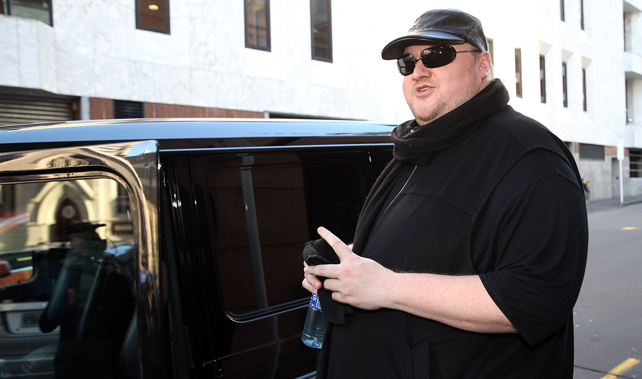
Millions of people around the world are adversely affected by the copyright infringement carried out by Kim Dotcom and his colleagues, the Crown says.
The extradition case against the internet mogul before the Auckland District Court was scheduled to last four weeks but today marks the start of its 10th.
The FBI laid charges in January 2012 when Dotcom and three others - Mathias Ortmann, Bram van der Kolk and Finn Batato - were indicted on 13 charges including copyright infringement, racketeering, money laundering and fraud.
Today's hearing had a late start after Dotcom's lawyer informed the court his client had been stopped by police on the way to court.
It is not the only mishap the controversial entrepreneur has suffered during the lengthy hearing.
A fall at home also saw him absent from court recently.
The US government, represented by the Crown and Christine Gordon, QC, began its closing arguments today.
Ms Gordon spent much of the morning taking Judge Nevin Dawson through the intricacies of the extradition treaty between New Zealand and the US, as well as case law and overseas cases supporting the Crown's bid to have the quartet extradited.
She said it was not just filmmakers who were being protected by the US government's legal action but all associated service industries and everyone "on the credits at the end of a movie".
"[If copyright infringement occurs] box office prices will go up and ultimately they may choose to stop making films altogether," Ms Gordon said.
"There are millions of people whose lives are prejudiced by this type of behaviour."
The defendants argued that copyright infringement could not be seen as "a species of fraud" but she said that opinion could not make any headway.
Ms Gordon said when the agreement was formed between the two countries in 1970 there was an understanding it captured many forms of fraud.
She also pointed to conversations between the men, which specifically mentioned "fraud".
In one intercepted communication Ortmann tells van der Kolk: "We did some things right. We allowed fraud for a long time, fueling our growth."
Ms Gordon said the men behind Megaupload also unlawfully took non-copyright-infringing videos from YouTube to make their website look legitimate and van der Kolk told his co-defendant he hoped YouTube did not "implement a fraud-detection system".
The Crown's closing is expected to run until tomorrow before Judge Dawson considers his decision.
Take your Radio, Podcasts and Music with you









